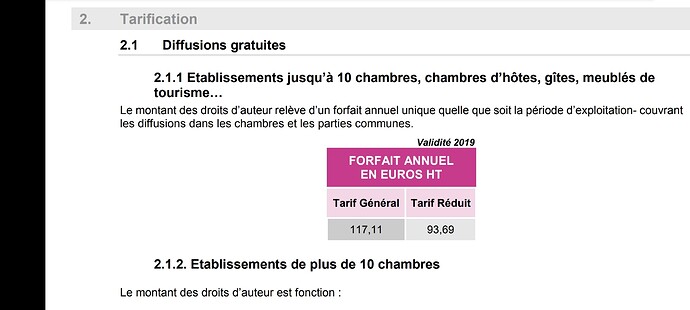The legislator, and the courts, already consider that distribution of copyrighted works to bedrooms in a commercial establishment is an act of communication of those works which requires consent of the author/creator. The government has brought gîtes, chambres d’hôte and the like under the same “commercial establishment” umbrella as bars, hotels, etc. If the establishment has no “parties communes”, nor private rooms, in which those works are communicated to the public, then it seems unlikely that there will be a case to answer. That wouldn’t IMHO stop the SACEM from pursuing the issue before the courts just to make a point if it felt it could, and judging from the government’s response to the question posed, the legislator didn’t care back in 2019. Perhaps the current government minister for culture might take a different view.
The SACEM tend to lean on their “mission de service public” to engage in somewhat questionable campaigns, and they are but one collecting society among the 22 officially recognised organisations for copyright and neighbouring rights management in France:
https://www.culture.gouv.fr/Thematiques/Propriete-litteraire-et-artistique/Conseil-superieur-de-la-propriete-litteraire-et-artistique/Liens-utiles/Organismes-de-gestion-collective
Similarly, the Centre Français de la Copie is doing the rounds of a number of seemingly increasingly wider professional circles with regards to declaration and payment of annual fees for storing, and making available to clients, staff, etc, 3rd party digital content relating to publications such as magazines, newspapers (and newspaper articles), journals, etc. Making these available digitally within a commercial establishment also falls under the auspices of communication to the public.
Politically, France sees itself as a champion of copyright in Europe and the world, it is also one of the EU states spearheading a campaign for a reduction in the safe harbour exceptions to liability for service providers. What this indicates is that the French government is unlikely to withdraw its support for the SACEM, even if it is seen to be exceeding the legal limits of its purview.
No doubt, the only way that this behaviour would be resolved one way or another would for an aggrieved party to take the SACEM to court, in the hope of getting a referral to the EUCJ. It seems fairly unlikely that the owner of a gîte or chambre d’hôte would have the means to do this, and that’s pretty much what the SACEM is banking on.



 - if you have a few hours to spare, you can read up on the current state of affairs of safe harbours within the EU commerce directive and copyright. Suffice it to say, copyright holders (read, large media corporations and collecting societies) are pushing for ever greater restrictions to the application of safe harbour provisions for service providers. Any chink or lack of detail/clarity in any of the EU Directives in relation to copyright and its enforcement inevitably seems to end up in a referral to the EUCJ.
- if you have a few hours to spare, you can read up on the current state of affairs of safe harbours within the EU commerce directive and copyright. Suffice it to say, copyright holders (read, large media corporations and collecting societies) are pushing for ever greater restrictions to the application of safe harbour provisions for service providers. Any chink or lack of detail/clarity in any of the EU Directives in relation to copyright and its enforcement inevitably seems to end up in a referral to the EUCJ.